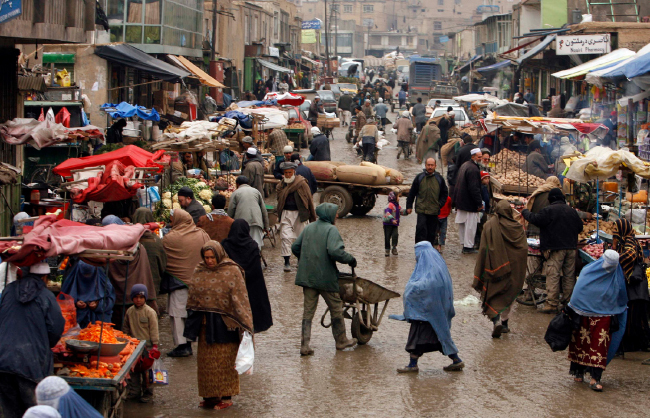The developments in Afghanistan in last two years – 2014 and 2015 – ushered in many of the today’s challenges the country is facing. With the upcoming war season just around the corner, there are growing concerns over how Afghanistan is going to cope with the enormous security, political and economic challenges that have gripped the country today and are going to further intensify. UN Secretary-General’s Special Representative for Afghanistan Nicholas Haysom said on Tuesday March 15, 2016 that Afghanistan was facing five major challenges to survive in 2016. According to the head of the UN mission in Afghanistan, UNAMA, the country would not be able to afford failing in dealing with these critical issues in this critical year.
Nicholas Haysom said that the Afghan government should deal with shrinking economy with low growth and high unemployment, the intensification of the insurgency and the fragile and fractured political environment. According to the UN Special Representative, the national unity government should also attract substantial aid from the international community and have ‘progress towards lasting peace’. He warned that failure in overcoming any of these challenges would be catastrophic for the country. The warming from the top UN representative comes at a time when the new peace initiative is in a deadlock and the Taliban are preparing for intensification of the group’s spring offensive.
In last two year, Afghanistan underwent key transitions. Firstly, Afghanistan had a crucial presidential election and its first peaceful transfer of power to the next administration. In the same year, the US-led NATO alliance concluded its combat mission and withdrew the bulk of its forces only keeping a small contingent for counter-terrorism mission and training Afghan forces.
The withdrawal of NATO forces had inevitable negative consequences for the country in areas of economy and security. It resulted to a considerable fall in flow of the international aid and stagnation of the economy due to decrease of economic activities. In fact, Afghanistan had to undergo an economic transition to cope with the economic consequences of the NATO pullout by finding new sources of revenues and helping growth of the economy.
The political transition went terribly flawed. The 2014 presidential elections and its political aftermaths plunged the country into a political crisis and pushed it to the brink of a potential instability and unrest. The flawed political transition had adverse impacts on overall situation of the country. Subsequent to the controversial elections, the political crisis in the country also caused a deep economic meltdown. The Afghan economy was never able to heal the harms of the election year. The political elite lost a valuable opportunity for making history by non-violent and non-scandalous transition of power in Afghanistan. Many of today’s challenges that the head of UN mission in Afghanistan believes are threatening survival of the country stem from the 2014 presidential elections and the political developments afterwards.
The agreement on formation of the national unity government, however, was ensued by a power struggle within the government that has continued to this day and left the administration ineffective and unfit for dealing with the existing challenges. In a critical juncture in the fight against the Taliban last year, a caretaker minister led the ministry of defense. Due to the lack of leadership, the anti-insurgency campaign lacked a robust leadership and the Afghan security and defense forces fought a defensive war against the militant groups. Along the political chaos going on in last two years, the security situation deteriorated to an unprecedented level.
Afghanistan is now bracing for another bitter year of war against the Taliban, while caretaker officials oversee all the security agencies. While the Taliban are preparing for their upcoming country-wide offensives, the government is starting to realize that the peace initiative may not help it in reducing violence and curbing the Taliban insurgency. The national unity government has been credited with effectively reaching out to the international community to better arm, equip and train Afghan security forces in the fight against the Taliban. However, it has had bad performance in empowering and strengthening the leadership of the country’s security forces as it has failed so far to end the internal power struggle over the security ministerial posts.
On other hand, the economic initiatives of the national unity government for growth of the economy and generating employment have failed to see much progress due to the deteriorating security situation. The government has announced various large-scale economic development plans for 2016 and the upcoming years. However, the good economic growth and development programs will need security and stability in the country to progress well and pay off for the country’s economy. For success of both the anti-insurgency campaign and the economic development plans, the government need to refocus on the management of the war and terrorism. Unless correcting the course, it will not be able to afford the deficit in the leadership of the anti-insurgency efforts.
In regards with political developments, the government will need to do more to garner political support it needs to deal with the security and economic challenges and the peace negotiations with the Taliban. The peace efforts seem to be largely in the right direction with the direction of the four-nation coordination group. However, the government needs to have ‘strategic patience’, as put by President Asraf Ghani, perseverance and more political support from the country’s political spectrum.
Home » Opinion » The Challenges Facing Afghanistan in 2016
The Challenges Facing Afghanistan in 2016
| Abdul Ahad Bahrami

